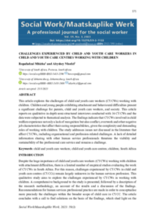Abstract:
This article explores the challenges of child and youth care workers (CYCWs) working with children. Children and young people exhibiting attachment and behavioural difficulties present a significant challenge for parents, child and youth care workers, and society. This article reports on qualitative in-depth semi-structured interviews conducted with 16 CYCWs and the data were subjected to thematical analysis. The findings indicate that CYCWs involved in child welfare experience not only a lack of recognition but also conflict, overwork and other negative job characteristics that affect their caring responsibilities, given the complexity and demanding roles of working with children. The study addresses issues not discussed in the literature that affect CYCWs, including organisational and profession-related challenges. A lack of detailed information sharing with other human service professionals threatens the viability and sustainability of the professional care service and remains a challenge.
Introduction:
Despite the huge importance of child and youth care workers (CYCWs) working with children with attachment difficulties, there is a limited number of empirical studies evaluating the work of CYCWs in South Africa. For this reason, challenges experienced by CYCWs in child and youth care centres (CYCCs) remain largely unknown in the human services profession. This qualitative study aims to explore the challenges experienced by CYCWs in working with children. A comprehensive background to the study is presented, followed by a description of the research methodology, an account of the results and a discussion of the findings. Recommendations for human services professional practice are made in order to conceptualise more precisely the challenges within the broader scope of child care in CYCC. The article concludes with a call to find solutions on the basis of the findings, which shed light on the organisational challenges, including poor communication, unsupportive management, issues with shifts, tensions stemming from social workers’ limited preparedness to deal with foster or reunification plans, and delayed management feedback.

